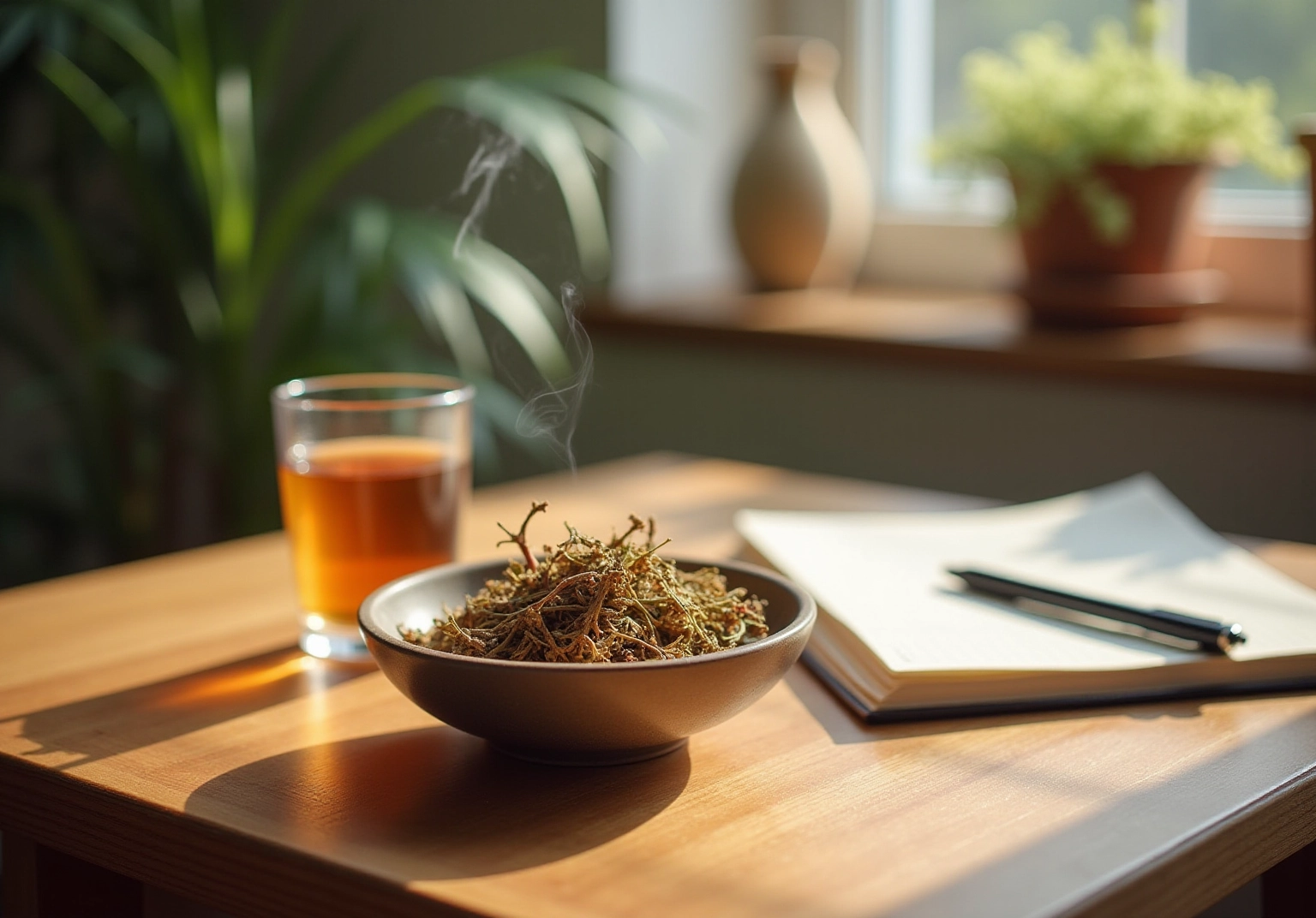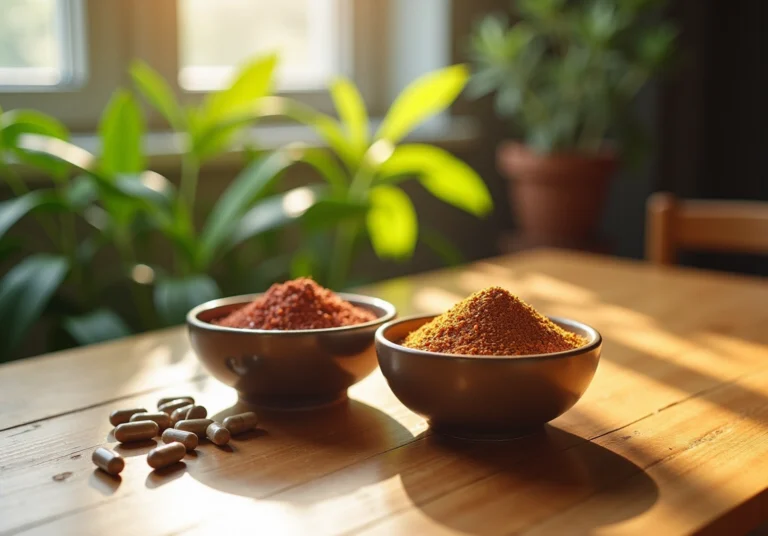Combine Rhodiola Rosea and Ashwagandha Together for Optimal Health
Overview
The combination of Rhodiola Rosea and Ashwagandha offers significant health benefits, including enhanced energy levels, improved mood, and effective stress relief through their synergistic effects. How do these two powerful herbs work together?
- Rhodiola is known for increasing stamina and cognitive function,
- Ashwagandha promotes relaxation and helps reduce cortisol levels.
When used in tandem, they create a powerful formula for overall well-being. This partnership not only boosts physical energy but also fosters mental clarity, making them an excellent choice for those seeking to optimize their health.
Introduction
The pursuit of optimal health often leads individuals to explore natural remedies. Two herbs that stand out in this quest are Rhodiola Rosea and Ashwagandha. Known for their adaptogenic properties, these powerful plants not only help combat stress but also enhance mental clarity and physical performance.
However, how can the combined effects of Rhodiola and Ashwagandha be harnessed safely and effectively? This article delves into their unique benefits, potential synergies, and essential guidelines for incorporating these herbs into a health regimen. By doing so, it provides readers with a roadmap to improved well-being.
Understand Rhodiola Rosea and Ashwagandha: Origins and Benefits
Rhodiola Rosea, commonly known as roseroot, is a perennial plant that thrives in the cold regions of Europe and Asia. Historically utilized in herbal remedies, it is celebrated for its adaptogenic qualities, which assist the body in adjusting to pressure. Key benefits include reducing fatigue, enhancing mental performance, and improving mood. A 2020 study indicated that individuals taking two rhodiola capsules experienced significant improvements in depression scores after 12 weeks, highlighting its effectiveness in managing anxiety and mood.
On the other hand, this ancient herb from Ayurvedic medicine is renowned for its calming effects and ability to lower cortisol levels, thereby reducing stress and anxiety. A 2021 meta-analysis found that 600 mg/day of Ashwagandha for over eight weeks improved sleep latency and efficiency, making it a valuable ally for those seeking better sleep quality. These herbs, specifically rhodiola rosea and ashwagandha together, offer a powerful combination for enhancing overall well-being.
Key Benefits:
- Rhodiola Rosea: Increases energy, improves cognitive function, and combats stress-related fatigue. It has been demonstrated to offer rapid relief from tension symptoms, often within days of use.
- Ashwagandha: Promotes relaxation, supports sleep quality, and enhances resilience to stress.
It is important to note that caution is advised when combining this herb with antidepressants or other medications affecting neurotransmitters, as interactions may occur. While this herb is generally regarded as safe for short-term use, reported side effects are often mild and uncommon, including dry mouth and dizziness. However, larger-scale trials are needed to confirm the herb’s role in treating chronic fatigue, anxiety disorders, or major depressive disorders. Understanding these benefits is crucial as it informs how they can work synergistically when rhodiola rosea and ashwagandha together are combined.
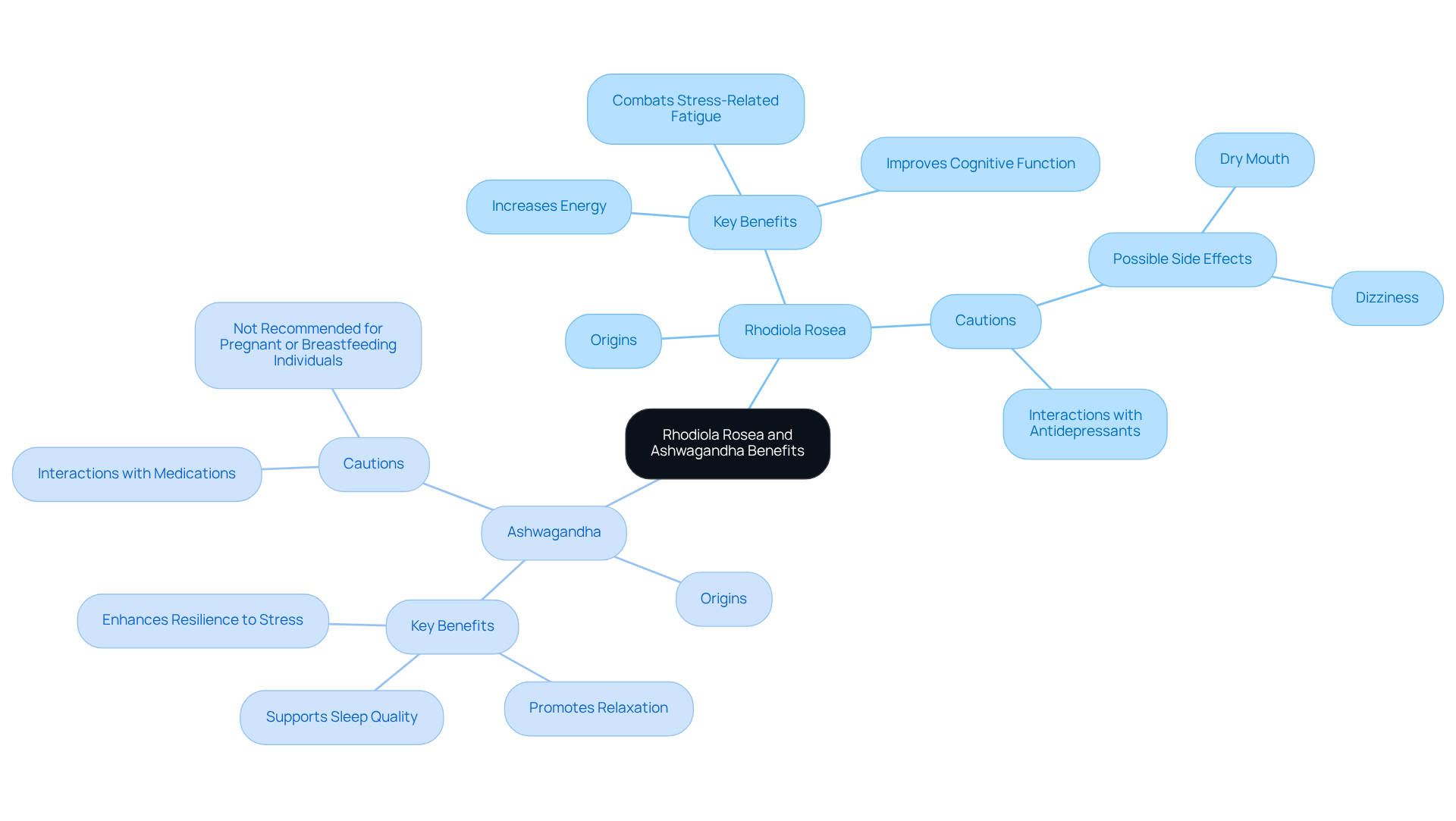
Explore the Synergistic Benefits of Combining Rhodiola and Ashwagandha
Mixing herbal remedies, such as rhodiola rosea and ashwagandha together, can lead to improved health advantages due to their synergistic effects. Rhodiola rosea and ashwagandha together are known for their stimulating qualities, enhancing energy and concentration, while they also provide a soothing effect that aids in coping with stress and anxiety. Rhodiola rosea and ashwagandha together create a balanced state of alertness and relaxation.
Synergistic Benefits:
-
Enhanced Energy Levels: Rhodiola has been shown to increase stamina and reduce fatigue, with studies indicating significant improvements in physical performance metrics. In contrast, Withania helps sustain energy levels without the jitters typically associated with stimulants, making it an ideal companion for another adaptogen.
-
Improved Mood and Stress Management: Using rhodiola rosea and ashwagandha together can lead to better emotional balance, effectively reducing symptoms of anxiety and depression. Studies have shown that Withania somnifera notably reduces serum cortisol levels, a vital hormone related to tension, while another herb boosts resilience against fatigue caused by pressure.
-
Cognitive Function: Together, the two herbs may enhance mental clarity and focus, making them particularly beneficial for individuals needing to perform under pressure. Clinical studies have shown that adaptogens can improve cognitive performance during stress, providing a potential strategy for managing stress-related cognitive decline.
This synergy makes the combination of rhodiola rosea and ashwagandha together particularly appealing for individuals looking to enhance their overall mental and physical health, especially in today’s fast-paced environment.
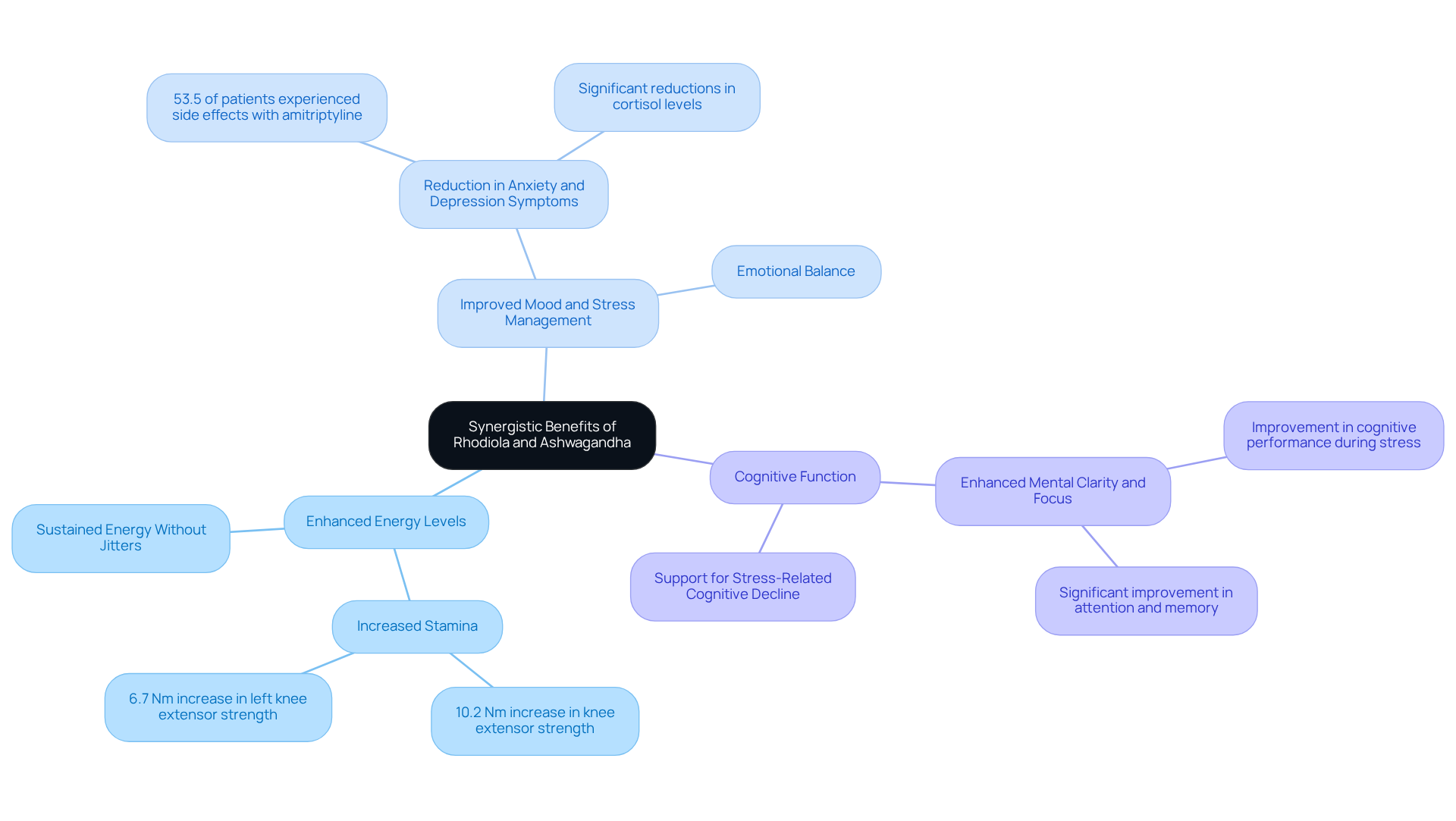
Implement Safe Practices for Combining Rhodiola and Ashwagandha
To safely combine Rhodiola Rosea and Ashwagandha, consider the following practices:
Dosage Recommendations:
- Rhodiola Rosea: Typical dosages range from 200 to 600 mg per day, taken in the morning to avoid potential sleep disturbances.
- Withania Somnifera: Suggested amounts range from 300 to 600 mg daily, typically consumed in the evening to encourage relaxation.
Timing of Intake:
Taking Rhodiola in the morning can help boost energy levels throughout the day, while Ashwagandha can be taken in the evening to support restful sleep.
Cycling the Herbs:
To maintain efficacy and avoid tolerance, consider cycling the use of these herbs. For example, take them for 6-8 weeks, followed by a 2-week break.
By following these guidelines, you can effectively incorporate rhodiola rosea and ashwagandha together into your health regimen.
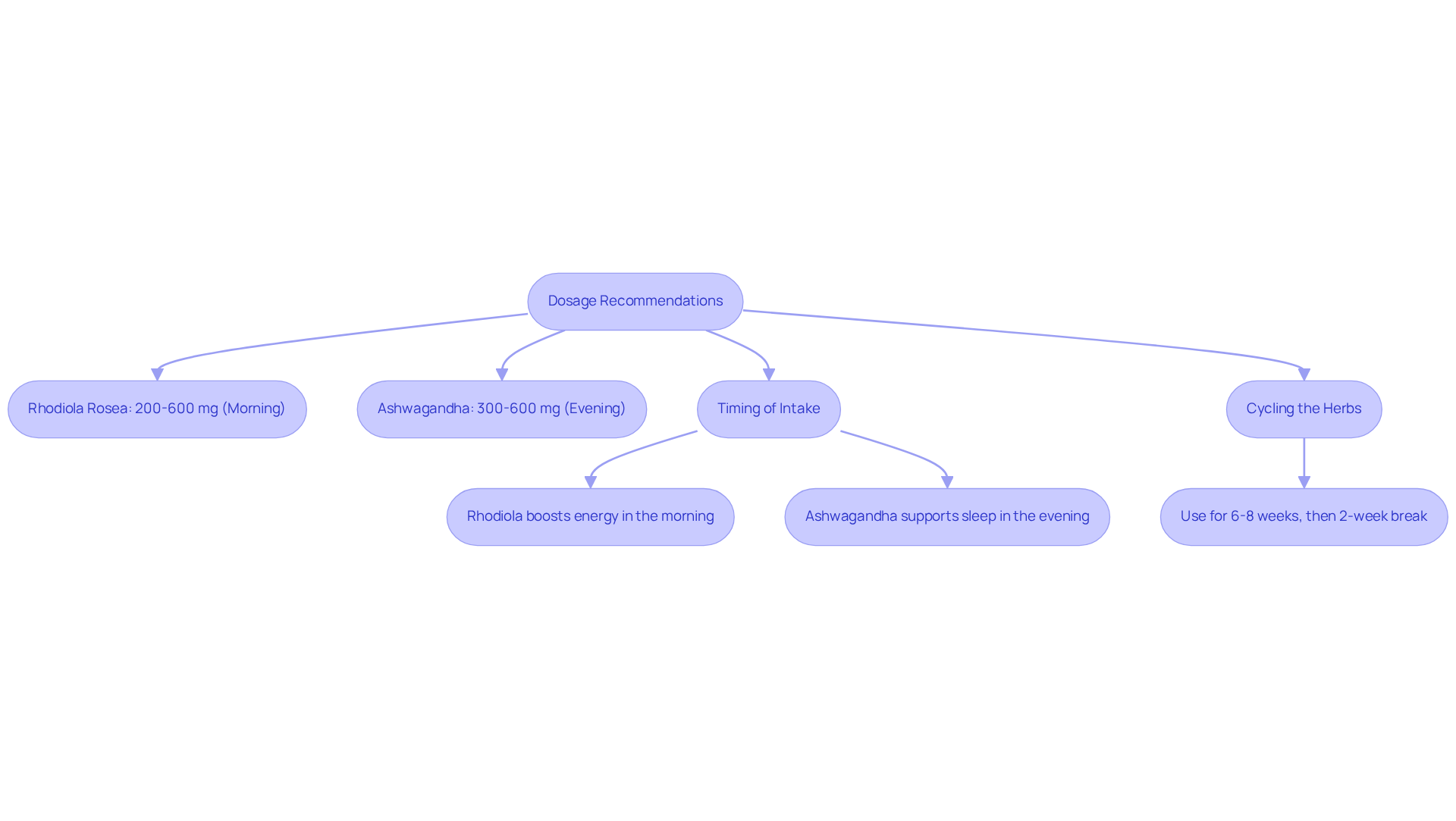
Identify Safety Considerations and Potential Side Effects
While using rhodiola rosea and ashwagandha together is widely regarded as safe for most individuals, it is crucial to recognize potential side effects and interactions.
Common Side Effects:
- Rhodiola Rosea: Users may experience dizziness, dry mouth, or gastrointestinal discomfort, particularly when first starting the supplement.
- Withania somnifera: Common side effects may involve drowsiness, stomach discomfort, and diarrhea, particularly at elevated doses.
Contraindications:
Individuals with specific health conditions, such as thyroid disorders or those on sedative medications, should seek guidance from a healthcare professional before combining these herbs. Recent findings suggest that this herbal remedy may interact with certain medications, making it essential to discuss any existing health issues with a provider.
Monitoring Your Response:
To ensure safety, begin with lower doses of both supplements to gauge your body’s tolerance. Gradually increase the dosage as needed while closely monitoring for any adverse reactions. If any concerning symptoms arise, consult a healthcare provider promptly.
By understanding these safety considerations, you can effectively harness the benefits of rhodiola rosea and ashwagandha together while minimizing potential risks.
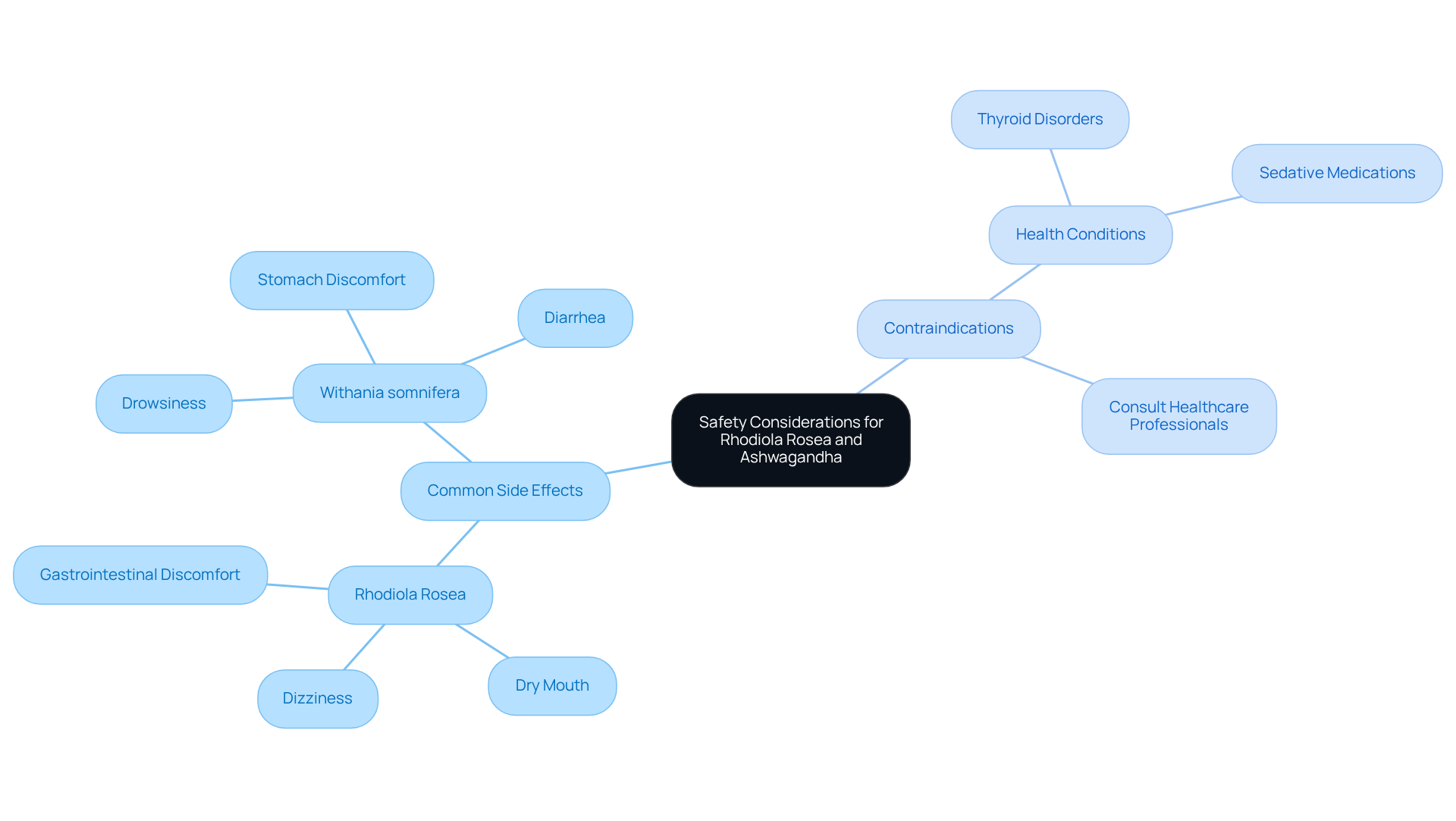
Conclusion
Combining Rhodiola Rosea and Ashwagandha presents a powerful strategy for enhancing overall health and well-being. These two adaptogenic herbs, each offering unique benefits, work synergistically to elevate energy levels, cognitive function, and stress management. By understanding their complementary effects, individuals can leverage their combined potential for optimal health.
Key benefits include Rhodiola’s capacity to combat fatigue and enhance mental clarity, alongside Ashwagandha’s calming effects that promote relaxation and improve sleep quality. Safety considerations, such as appropriate dosage and potential side effects, are vital to ensure that the integration of these herbs is both effective and safe. Awareness of individual health conditions and careful monitoring of reactions is crucial when beginning any new supplement regimen.
Incorporating Rhodiola Rosea and Ashwagandha into daily routines can lead to significant enhancements in both physical and mental health. As life’s demands continue to rise, utilizing these herbs may provide the balance necessary to thrive. Embracing this herbal combination not only supports individual wellness but also fosters a more holistic approach to health management.
Frequently Asked Questions
What is Rhodiola Rosea and where does it grow?
Rhodiola Rosea, commonly known as roseroot, is a perennial plant that thrives in the cold regions of Europe and Asia.
What are the key benefits of Rhodiola Rosea?
Key benefits of Rhodiola Rosea include reducing fatigue, enhancing mental performance, improving mood, and providing rapid relief from tension symptoms.
What does research say about the effectiveness of Rhodiola Rosea?
A 2020 study indicated that individuals taking two rhodiola capsules experienced significant improvements in depression scores after 12 weeks, highlighting its effectiveness in managing anxiety and mood.
What is Ashwagandha and what are its traditional uses?
Ashwagandha is an ancient herb from Ayurvedic medicine known for its calming effects and ability to lower cortisol levels, thereby reducing stress and anxiety.
How effective is Ashwagandha for sleep improvement?
A 2021 meta-analysis found that taking 600 mg/day of Ashwagandha for over eight weeks improved sleep latency and efficiency.
What are the combined benefits of Rhodiola Rosea and Ashwagandha?
Together, Rhodiola Rosea and Ashwagandha offer a powerful combination for enhancing overall well-being, increasing energy, improving cognitive function, promoting relaxation, and supporting sleep quality.
Are there any precautions when using these herbs?
Caution is advised when combining these herbs with antidepressants or other medications affecting neurotransmitters, as interactions may occur.
What are the common side effects of Rhodiola Rosea and Ashwagandha?
Reported side effects are often mild and uncommon, including dry mouth and dizziness.
Is there sufficient research on the long-term effects of these herbs?
Larger-scale trials are needed to confirm the role of Rhodiola Rosea and Ashwagandha in treating chronic fatigue, anxiety disorders, or major depressive disorders.
